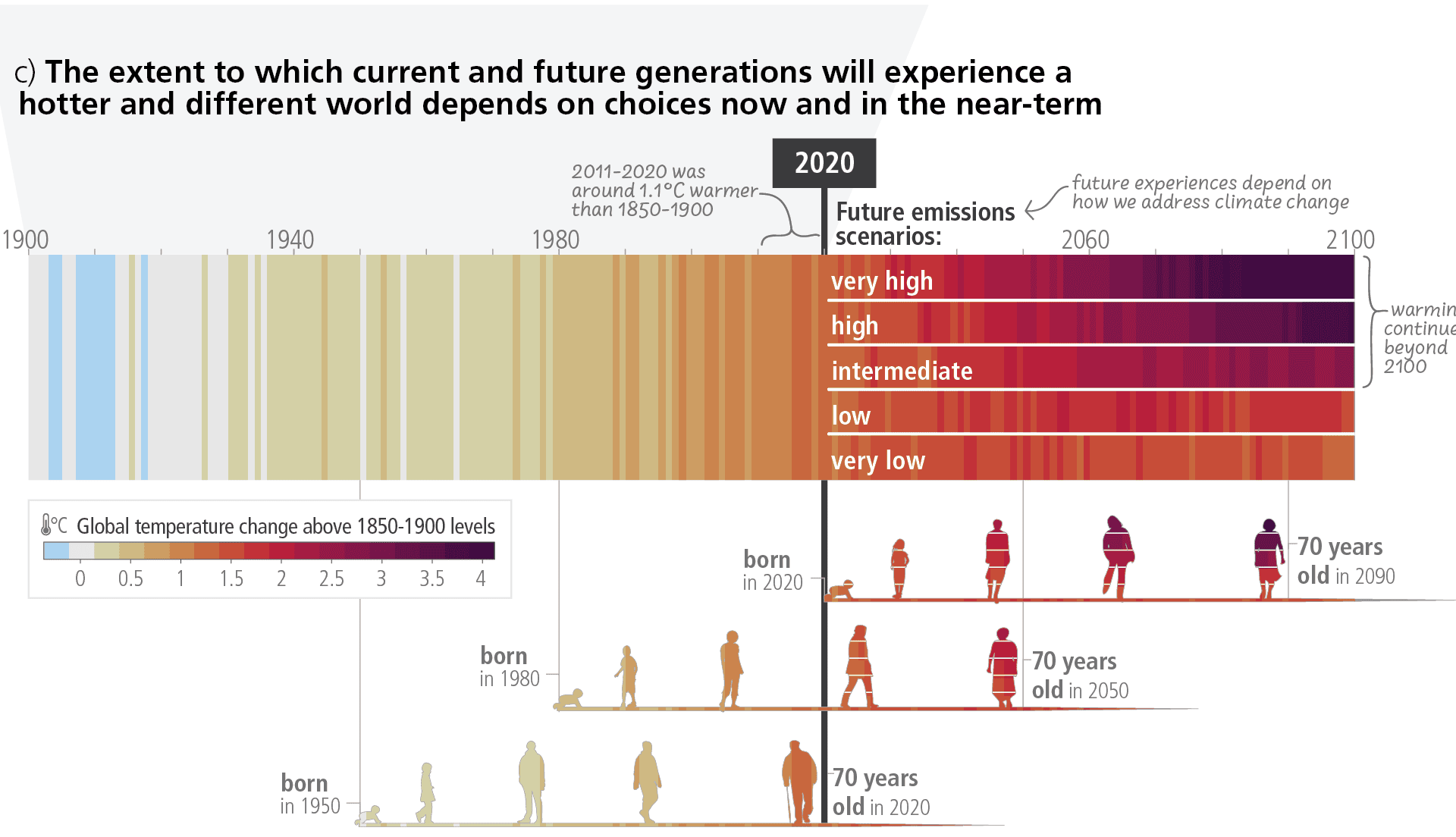The UN Intergovernmental Panel on Climate Change’s (IPCC’s) Synthesis Report of the Sixth Assessment Report (AR6) provides an overview of the latest scientific knowledge on climate change. The Climate Governance Initiative has analysed this latest IPCC report and developed key recommendations for board directors leading their businesses through climate transition.
The UN Intergovernmental Panel on Climate Change’s (IPCC’s) Synthesis Report of the Sixth Assessment Report (AR6) provides an overview of the latest scientific knowledge on climate change. With the IPCC’s next report expected around 2030, this is likely to be its last assessment report published in this critical decade for climate action.
The role of businesses and investors in the transition to a sustainable climate is significant. By setting ambitious targets for reducing emissions and implementing robust strategies to manage risks and opportunities, businesses can make significant progress towards achieving large-scale climate action.
Our summary of the report can be distilled into the following takeaway points:
Limiting global warming to 1.5°C above pre-industrial levels is still achievable but requires immediate, rapid, and large-scale reductions in greenhouse gas emissions.
- Board directors play an important role in ensuring the organisations they represent set, and deliver upon, ambitious climate targets and transition plans.
The report provides unequivocal evidence of the link between human activity and global warming. It highlights the devastating risks and impacts for people and nature, including material risks for business.
- Board directors should consider these risks and impacts for the businesses (and broader value chains) they oversee, disclose the findings, and put in place appropriate measures to address them.
The cost of inaction is likely to be much higher than the cost of action to limit warming to 1.5°C in the medium to long-term.
- Bold climate leadership today, both to reduce emissions and adapt to the impacts of climate change, will serve long-term business interest.
Background
On 20 March 2023, the IPCC published its Synthesis Report of the Sixth Assessment Report to inform policymakers of the latest evidence on climate science. This report has been released in time to inform the 2023 Global Stocktake by the United Nations Framework Convention on Climate Change (UNFCCC). Hundreds of experts from the scientific community collaborated to provide an integrated and updated view of climate change, endorsed and approved by governments across the world. The Synthesis Report extracts key insights from six previous reports, including three IPCC Working Group Reports and three Special Reports: Global Warming of 1.5°C; Climate Change and Land; and Ocean and Cryosphere in a Changing Climate. Summaries for board directors of previous IPCC reports can be found here.
A call for urgent action
The report makes clear that the lives of future generations depend on the actions we take now. While people in their 60s and 70s today have mostly experienced the effects of a slow but steady rise in global temperatures, their grandchildren are born into a world of rapidly rising temperatures with more extreme weather events and potentially devastating risks.
International cooperation, effective policy and governance, and climate finance are vital to turning this reality around.

Extract from ‘Adverse impacts from human-caused climate change will continue to intensify’
Source: IPCC, 2023. Synthesis Report of the Sixth Assessment Report, Figure SPM.1, p.7
Key messages for board directors
The IPCC report restates the emergency of the climate crisis and the potential risks and opportunities associated with the transition to a net-zero economy. Businesses risk experiencing significant losses due to climate change, but can also collectively influence a large share of global emissions, and are well-suited to take a leading role in a just transition to net zero.
As a board director, it may be helpful to consider the business implications of the report’s findings summarised in the following key messages:
Assess and disclose climate-related risks and opportunities. Global temperature has increased by 1.1°C and is still on the rise. The report provides evidence of the increasing risks and impacts from climate change.
- Reconsider what these risks and impacts mean for the businesses you oversee.
- Advise your organisation to conduct a climate risk assessment and disclose the findings in its annual reports.
- Ensure the organisation is developing plans to manage and mitigate these risks, including within its value chain.
Embed climate change into decision-making processes. The IPCC emphasises the role of governance in facilitating the transition to a low-carbon economy.
- Ensure that your organisation’s governance structure reflects the urgency of the climate crisis and that it is committed to net zero with robust science-based targets and appropriate incentive schemes in place to deliver this.
- Request for climate change to be a standing item on the board agenda and integrated across the whole business strategy, not siloed into specific teams or roles.
Move away from fossil fuel dependency. The report notes that the remaining carbon budget to limit global warming to 1.5°C could easily be exhausted this decade. The IPCC urgently calls to halt fossil fuel infrastructure expansion and rapidly scale-up investment in clean energy alternatives.
- Encourage the organisation you represent to switch to renewable energy sources as part of its net-zero strategy and climate transition plan.
- Raise this issue in the boardroom and explore ways that the organisation can transition away from fossil fuel use, both within its operations and throughout its value chain.
Collaborate with national and international climate actors. The IPCC highlights the importance of global cooperation in addressing climate change.
- Encourage your organisation to create partnerships or coalitions with other businesses, NGOs, universities, and the public sector to help fund research and develop sustainable practices and technologies.
- Support engagement with all relevant stakeholders to understand expectations, concerns and priorities relating to climate change, helping to develop a robust climate transition plan which attracts and retains employees, consumers and investors.
Capitalise on the low-carbon transition and support climate finance. The report highlights the potential opportunities associated with the transition to a low-carbon economy, and recognises that mobilising climate finance requires private sector investment and innovative financial mechanisms.
- Consider whether investing in renewable energy, carbon dioxide removal (CDR) technologies and ecosystem-based adaptations (nature-based solutions) could benefit your organisation, both to achieve corporate net zero commitments and as an investment opportunity in the broader transition to a net zero future.
Support and advocate for effective climate policies. Emerging and ambitious climate policies are likely to develop from the IPCC’s findings.
- Consider how upcoming national and international policy and regulation will affect the organisations you represent, and push for policies that promote the transition to a low-carbon economy, and support a sustainable and resilient future for business.
Main findings of the IPCC report
Where we are now
1. The IPCC confirms human activities are responsible for climate change and that the burden is unequally shared.
The report confirms that by 2020 global surface temperatures reached 1.1°C above pre-industrial levels. Evidence unequivocally points to greenhouse gas (GHG) emissions from human activities as the main cause of global warming. The report highlights the unequal share of GHG emissions: 41% of the world’s population lives in countries that emit less than one-third of high-emitting countries (9 tCO2-eq per capita) However, many low-emitting nations are particularly exposed to climate change risks, and will disproportionally be affected by losses and damages.
2. A sharp decline in GHG emissions is necessary to reduce climate risks.
The report estimates that, to keep global warming within 1.5°C as pledged in the Paris Agreement, GHG emissions must decline by 43% by 2030 and 84% by 2050. Limiting global warming to 2°C requires smaller GHG reductions but poses higher risks, including heat-induced diseases and mortality, flooding of coastal cities, biodiversity loss, and reduced food production. Climate risks could also trigger or amplify other risks, like conflict. The IPCC warns that, even if we limit climate change to 1.5°C warming, some future changes are inevitable or irreversible, like coral reef damage.
3. Existing policy is not enough to limit global warming.
The report warns that an ‘emissions gap’ exists as Nationally Determined Contributions (NDCs) are not currently sufficient to limit global warming to 1.5°C. The IPCC estimates that, even under a very low GHG scenario, it is more likely than not that the global temperature will reach a 1.5°C increase. However, a prompt and persistent reduction in GHG emissions would result in a noticeable slowdown of global warming within approximately twenty years.
Where do we need to go
1. Benefits from limiting global warming would outweigh the costs of climate mitigation.
The report highlights the broadly accepted economic case that ‘the global economic and social benefit of limiting global warming to 2°C exceeds the cost of mitigation’.
Mitigation to reduce emissions and adaptation to decrease the effects of the inevitable impacts need to be applied broadly and quickly. These include climate policy, technology, and ecosystem-based adaptations. Some come at a low cost, and many could bring extra benefits such as reduced air pollution, improved livelihoods, and efficient agriculture.
2. Effective climate policy and governance could pave the way to net zero.
The IPCC identifies a range of policies that could support GHG emissions reductions and support a transition to net zero, including removing fossil fuel subsidies, implementing carbon pricing, and using biological and non-biological CDR to address unavoidable ‘residual’ GHG emissions. The report highlights that effective governance structures are key in supporting climate action: at multiple levels and with manystakeholders for decision-making, including indigenous peoples, the young, and women.
3. International cooperation is needed to scale-up climate finance.
The IPCC notes that financing the transition to a low-carbon economy will require a significant increase in investment, but that there is sufficient global capital and liquidity to support the transition. We need to mobilise financial resources to six times the existing levels for a 1.5°C scenario, and three times for 2°C scenario The report highlights the importance of international collaboration and the need for climate finance to support developing countries in both mitigation and adaptation efforts.
Next steps
- Consider how your organisation can integrate the Principles for Effective Climate Governance into its strategy.
- Join your local Chapter of the Climate Governance Initiative to engage with board directors of organisations operating in your country.
Read the Ambition to Action briefing to build your understanding of the four basic requirements for organisations to move their climate ambition forward.



